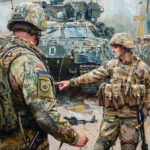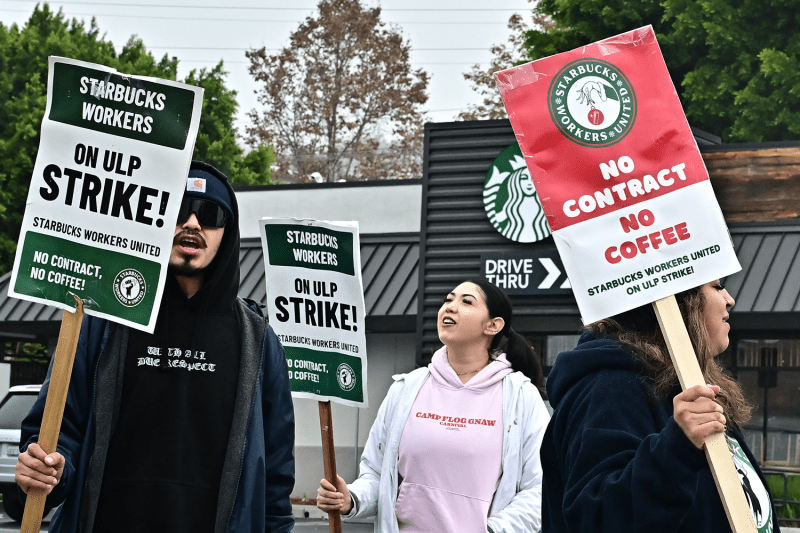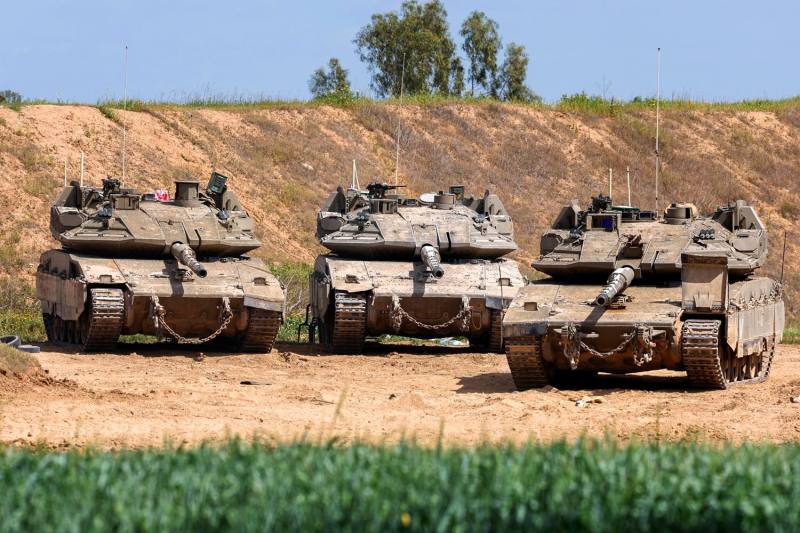U.S.-China Trade War Intensifies

U.S.-China Trade War Intensifies
Beijing is seeking new deals elsewhere to weather the storm, but some countries are opting out for fear of angering the White House.
U.S. President Donald Trump delivers remarks during a cabinet meeting at the White House in Washington on April 10. Anna Moneymaker/Getty Images
Welcome back to World Brief, where we’re looking at the growing U.S.–China trade war, a prisoner swap between the United States and Russia, and New Zealand rejecting legislation aimed at reinterpreting its founding document.
Tariff Standoff
U.S. President Donald Trump’s latest trade moves are still top of mind for most foreign powers, global markets, and American consumers. While much of the world is breathing a sigh of relief over Trump’s decision on Wednesday to impose a 90-day pause on new, higher reciprocal tariffs targeting nearly 100 partners, one country is still in the doghouse. And U.S. investors are concerned.
Welcome back to World Brief, where we’re looking at the growing U.S.–China trade war, a prisoner swap between the United States and Russia, and New Zealand rejecting legislation aimed at reinterpreting its founding document.
Tariff Standoff
U.S. President Donald Trump’s latest trade moves are still top of mind for most foreign powers, global markets, and American consumers. While much of the world is breathing a sigh of relief over Trump’s decision on Wednesday to impose a 90-day pause on new, higher reciprocal tariffs targeting nearly 100 partners, one country is still in the doghouse. And U.S. investors are concerned.
The White House issued a statement on Thursday confirming that the three-month suspension will not affect China. Instead, Trump raised the minimum tariff rate on Beijing to 145 percent, effective immediately; this includes the 125 percent duty that Trump announced Wednesday as well as the 20 percent levy that he issued near the start of his second term.
China has responded with its own set of retaliatory measures, including raising tariffs to 84 percent effective Thursday. And Beijing is reportedly also turning to other countries to help weather the storm, notably including those in the European Union.
“China is willing to work with the EU to jointly implement the important consensus reached by the leaders of China and the EU, strengthen communication and exchanges, and deepen China-EU trade, investment and industrial cooperation,” China’s Xinhua News Agency wrote on Thursday around several calls between high-level Chinese and European officials.
Not all countries are interested in boosting trade with Beijing, though. Australia and India have reportedly turned down Chinese calls for greater cooperation, and many South Asian nations have chosen the silent treatment for fear of potentially angering the White House. “Unlike China and some other global powers, most South Asian countries are too economically fragile to take retaliatory measures and risk an all-out trade war with the United States,” FP’s Michael Kugelman wrote in this week’s South Asia Brief.
U.S. stock markets also continued to tumble on Thursday over concerns of what a trade war with China could look like. By mid-afternoon, the Dow had dropped 5 percent, the S&P 500 had fallen 5.9 percent, and the Nasdaq had plunged 6.9 percent.
“There will always be transition difficulty,” Trump said on Thursday. “But in history, it was the biggest day in history, the markets,” he added, referring to the market rally that occurred on Wednesday upon Trump issuing his 90-day about-face. “So we’re very, very happy with the way the country is running.”
Trump said on Wednesday that his decision to pause reciprocal tariffs was due to market freakouts. “They were getting a little bit yippy, a little bit afraid,” he said. But U.S. lawmakers on both sides of the aisle are jumping on the opportunity to try to pull back some of the president’s expanded trade authority.
Even still, negotiations appear back on the menu for many U.S. trading partners. The European Union announced on Thursday that it will suspend its first wave of retaliatory duties for 90 days to focus on talks with the White House. And U.S. Treasury Secretary Scott Bessent said Deputy Vietnamese Prime Minister Ho Duc Phoc has agreed to begin formal dialogue with Washington to address trade concerns.
Today’s Most Read
- Why Don’t Russian Soldiers Revolt? by Amelie Tolvin
- Trump and Xi Are in a Tariff Trap by Craig Singleton
- How to Ruin a Country by Stephen M. Walt
What We’re Following
Returning home. Moscow released dual Russian American citizen Ksenia Karelina on Thursday in a prisoner swap deal with the United States. Karelina was arrested last February while visiting her family and sentenced to 12 years in prison for donating $51.80 to a U.S.-based charity providing humanitarian aid to Ukraine.
This is the second major prisoner swap between the two adversaries since Trump took office in January. In return for Karelina’s release, Washington freed Russian German national Arthur Petrov, who was arrested in Cyprus in August 2023 for allegedly exporting sensitive U.S. electronics to the Russian military. The United Arab Emirates mediated the exchange.
The prisoner swap marked another sign of warming bilateral ties between the White House and the Kremlin. On Thursday, U.S. and Russian officials met in Istanbul to discuss normalizing their respective diplomatic operations. Russia’s ambassador to the United States, Alexander Darchiev, said the meeting took place in a “positive atmosphere and allowed us to move forward in resolving this task.” However, Washington maintains that the issue cannot be resolved until Russia allows the U.S. Embassy in Moscow to employ local staff.
Addressing Maori rights. New Zealand’s Parliament rejected legislation on Thursday aimed at reinterpreting the country’s founding document, the Treaty of Waitangi, by a vote of 11 in favor to 112 against. “This bill hasn’t been stopped. This bill has been absolutely annihilated,” said Hana-Rawhiti Maipi-Clarke, a parliamentarian who led a haka (or Maori war dance) during a debate to oppose its passage.
The proposed Treaty Principles Bill, submitted by the right-wing ACT Party, sought to explicitly codify the treaty’s values into three core principles, in what its supporters argued would improve the nation’s social cohesion.
However, the effort triggered mass public backlash, with tens of thousands of people protesting the legislation in some of the country’s largest demonstrations in history. Opponents of the bill warned that its passage would create greater social divides between the country’s Indigenous Maori and non-Maori populations, as it would not take into account social disparities caused by British colonialism, and that it may not comply with international law.
Nuclear talks. The U.S. Treasury Department issued new sanctions on Wednesday targeting five companies and one person based in Iran for their alleged support of Tehran’s nuclear program. “The Iranian regime’s reckless pursuit of nuclear weapons remains a grave threat to the United States and a menace to regional stability and global security,” Bessent said.
Iran’s leaders maintain that the country is not seeking a nuclear weapon, and Trump’s national intelligence director, Tulsi Gabbard, testified before Congress last month that the U.S. intelligence community believes that Tehran is not building a nuclear bomb and that the country’s supreme leader has not reauthorized the nuclear weapons program.
The new U.S. sanctions come just days before senior U.S. and Iranian officials are set to convene in Oman on Saturday for what the White House has called “direct” talks concerning Tehran’s nuclear development efforts. Iran, however, said the dialogue will be “indirect” through a mediator. During Trump’s first term, in 2018, the United States pulled out of the Iranian nuclear weapons deal, saying it allowed Tehran to fund militant proxy groups in the region, including Hamas and Hezbollah.
On Wednesday, Trump warned Iran that Israel would be the “leader” of a potential military strike against the country if no new nuclear deal is ultimately reached. “If it requires military, we’re going to have military,” Trump said. Israeli Prime Minister Benjamin Netanyahu has backed Trump’s Iran strategy but specified that he hopes they can come to a diplomatic solution.
Odds and Ends
More than 500 runners gathered at Kim II Sung Stadium on Sunday for North Korea’s first Pyongyang International Marathon in six years. The circular route took the athletes around “iconic buildings, monuments and streets” in the capital before looping through the countryside. More than 200 foreign runners participated in the race, though to do so, they had to purchase a $2,500 travel agency trip. Athletes from the United States, South Korea, and Malaysia were excluded due to ongoing diplomatic tensions with their countries, but that’s OK for this World Brief writer, as she is allergic to running.
Alexandra Sharp is the World Brief writer at Foreign Policy. X: @AlexandraSSharp
More from Foreign Policy
-

American flags are draped around tables and pipes in a small factory room as women work at sewing machines to produce them. Tariffs Can Actually Work—if Only Trump Understood How
Smart trade policy could help restore jobs, but the president’s carpet-bomb approach portends disaster.
-

Donald Trump looks up as he sits beside China’s President Xi Jinping during a tour of the Forbidden City in Beijing on Nov. 8, 2017. Asia Is Getting Dangerously Unbalanced
The Trump administration continues to create headlines, but the real story may be elsewhere.
-

Trump announces tariffs Trump’s Wanton Tariffs Will Shatter the World Economy
Economic warfare is also a test for U.S. democracy.
-

The Department of Education building in Washington, DC on March 24. Why Republicans Hate the Education Department
Broad popular support means that even Ronald Reagan failed at dismantling the agency.








Join the Conversation
Commenting on this and other recent articles is just one benefit of a Foreign Policy subscription.
Already a subscriber?
.
Subscribe
Subscribe
View Comments
Join the Conversation
Join the conversation on this and other recent Foreign Policy articles when you subscribe now.
Subscribe
Subscribe
Not your account?
View Comments
Join the Conversation
Please follow our comment guidelines, stay on topic, and be civil, courteous, and respectful of others’ beliefs.
Change your username |
Log out
Change your username:
CANCEL
Confirm your username to get started.
The default username below has been generated using the first name and last initial on your FP subscriber account. Usernames may be updated at any time and must not contain inappropriate or offensive language.